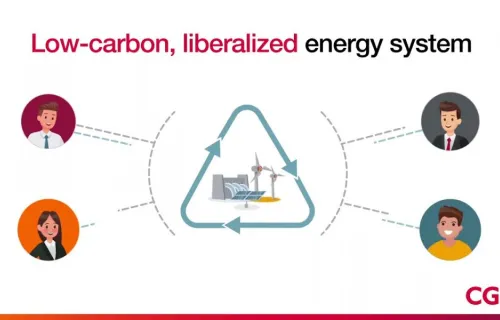Are there learnings for the utilities industry from an augmented reality game’s incredible 19-day time-to-market, or the possibility that flying taxis could become cheaper than owning a car?
The 8th CGI Central Market Debate, attended by more than 50 global industry experts, influencers and executives from across Europe, raised many such thought-provoking questions and discussions on trends, technologies and implementation approaches in the energy market.
Held in Prague, the event involved two days of candid discussions, networking opportunities and knowledge sharing around this year’s theme: How can data exchanges between market participants extend and enhance the market and its operation to benefit consumers?
My colleague Ana Domingues and I have rounded up the following 7 key takeaways from the event.
#1 – Openness and access to real-time data will be instrumental in facilitating the market.
Market facilitation needs to be seen as an opportunity to empower ecosystem players—both in competitive and non-competitive roles—to innovate iteratively with a view toward long-term value creation. Facilitating openness and access to real-time data will be critical for enabling such a system. Today, massive volumes of data are collected through sensor networks, smart meters, customer payments and satellite imagery. Delivering on the benefits of all this data will continue to be a key consideration for utilities as they navigate the energy transition and support the creation of new business models.
#2 – Data platforms must drive innovation.
The role of grid operators or distribution system operators (DSOs) is changing. They are asked by the European Union to be market makers, to drive innovation and to foster the creation of start-ups that challenge the status quo. This requires developing data platforms that provide market players with easy access to high volumes of valuable data to better enable innovation at pace and at scale. Currently, innovation is not happening at pace, with traditional suppliers innovating only for a very small percentage of customers. During the event, participants agreed that the market would welcome disruptive new business models based on full digital services, as discussed in my earlier blog, “Delivering on the benefits of data".
#3 – Delivering high-quality data and building trust is paramount.
Deriving value from data goes beyond collecting it and making it accessible. Harnessing its true value lies in enhancing raw data by aggregating it from multiple sources, curating it and applying algorithms to harvest insights. Ensuring there are no legal issues in its usage is another key aspect. Providing data that meets standards for both quality and legality will help to build trust in the marketplace driving a network effect of data.
#4 – Capitalizing on the network effect of data.
To provide the best value to the ecosystem, data owners, particularly utilities looking to become data service providers to the market, need to recognize the network effect of data and how it can support the development of new services or products, drive new ways of creating and delivering value, and support new business and operating models. To capitalize on the network effect of data, grid operators must resist the temptation to try to determine the value of data upfront while, at the same time, make sure they balance the costs and risk of providing all the data they have. However, some organizations do not want to disclose their data because either they are regulated businesses or they see commercial value in the data and are reluctant to make it widely available.
#5 – Maintaining ownership of data is key to its use.
Being able to identify clearly the ownership of data—at the wholesale, corporate and consumer levels—is important to drive its use. In addition, making the ownership traceable, i.e., linking the right data to the right consumer, is foundational to any open data concept. For many liberalized energy markets, identifying data ownership is a challenge. However, transmission system operators (TSOs) such as Estonia’s Elering and Finland’s Fingrid are already addressing this challenge through national identity systems. The framework for securing consumer data sharing already has been implemented in open banking, where consumers can choose with whom they want to share their data, and utilities can learn from the banking industry’s more advanced practices.
#6 – Top-down and bottom-up initiatives are required.
Not long ago, sources of energy generation were connected to the transmission grid. As of April 6 this year for Portuguese utility EDP, 79% of energy is being connected to their distribution grid. This illustrates a growing need for DSOs to become real market facilitators, which will require interlinking the energy market and DSOs to exploit flexibility and manage the energy transition. The key role DSOs will play in facilitating flexibility lies at the core of the argument favoring the growing importance of local roles and decentralization of the energy system. Equipping the DSO to perform its role as market facilitator also calls for universal market interfaces and the development of application programming interfaces (APIs) to allow any market platform to interact with DSOs for data sharing and market coordination activities. Some central market operators, however, advocate that the proliferation of APIs will make it harder to use them by a growing number of market players.
#7 – Advancing TSO-DSO collaboration to drive flexibility.
DSOs and TSOs went from “agreeing to disagree” in 2018 to “agreeing on everything” at this year’s Central Market Debate. The recent TSO/DSO report on Active System Management is a testament to the advancing collaboration between the two market players for the development and integration of new flexibility services to manage the energy transition. This strengthened cooperation could lead to a proliferation of platforms to support balancing, congestion management and local energy communities, raising an interesting question on the possible need for a “platform of platforms.”
The CGI Central Market Debate is a by-invitation, interactive event held every year to bring together stakeholders across the energy value chain to discuss and debate the future developments of central market operations and their crucial role in enabling a competitive and sustainable energy market. If you would like to participate in next year’s event, or would like to speak with our central market experts, please do get in touch with Ana or me.






